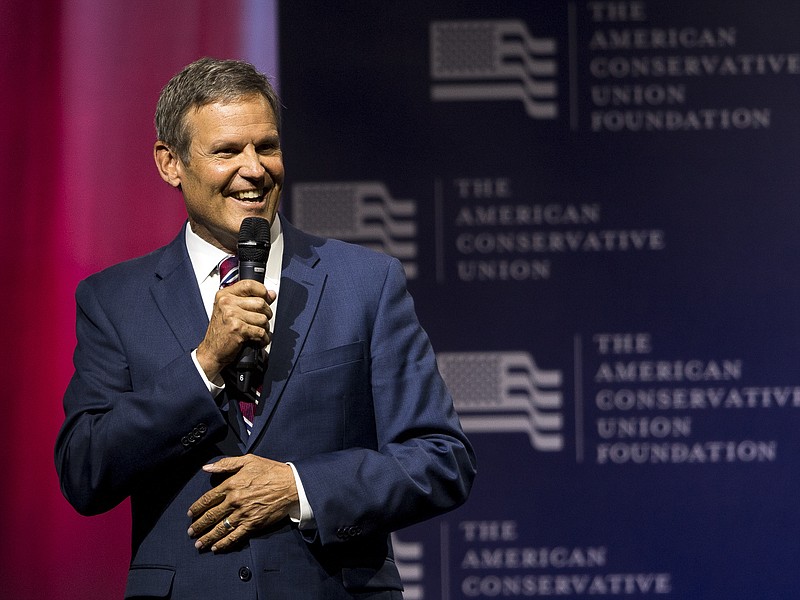NASHVILLE, Tenn. - Tennessee Republican Gov.-elect Bill Lee will enter office Jan. 19 with a strong favorability rating of 57 percent, according to the latest Vanderbilt University Poll.
Only 22 percent of the 1,004 registered voters surveyed held an unfavorable view of the Williamson County businessman who beat Democrat Karl Dean with 59 percent of the vote in the November election to succeed term-limited Gov. Bill Haslam, also a Republican.
The survey had a margin of error of plus or minus 4 percent, according to a university news release.
Findings also suggest Lee will have support for some of his proposals such as expanding vocational training in K-12 schools, according to a news release.
Meanwhile, health care has surpassed the economy and education for the first time in the poll's history as Tennesseans' chief priority for state government.
"Overall, we see support for an agenda that could work for our incoming governor," said John Geer, Gertrude Conaway Vanderbilt Professor of Political Science and co-director of the Vanderbilt Poll. "Education and the economy are strong priorities, as well as immigration and infrastructure."
Poll co-director Josh Clinton, Vanderbilt's Abby and Jon Winkelried Professor of Political Science, said the "one worry Bill Lee must deal with is health care, which has risen in importance to Tennesseans. Although the two are related, health care now takes precedence above the economy to voters here."
Thirty percent of Tennesseans picked health care as their top priority from a list of issues. Another 20 percent recommended it as the state's second-highest priority.
The survey also found that opioid addiction remains a high concern: 86 percent of Tennesseans surveyed characterized it as an emergency or a major problem, while 43 percent say they personally know someone affected by it.
Lee says he wants to improve health care in a state with high rates of uninsured people and where residents also rank poorly compared to most states in terms of death from stroke, heart disease, cancer, alzheimer's disease and flu and pneumonia.
But both Lee and the Republican-controlled General Assembly oppose expanding Medicaid coverage under the federal Affordable Care Act to several hundred thousand low-income adults.
The survey found Medicaid expansion highly popular among most Tennesseans with 66 percent - two thirds - favoring it.
Noting that Lee and lawmakers' stances are at odds with public opinion, Geer said that's not unique to Tennessee. He said Medicaid expansion has been approved by voters in some other states where residents voted for it.
"There were three Republican-dominated states - Idaho, Nebraska and Utah - with the same dynamic that voted via referendum for Medicaid expansion in the last election," Geer said.
Poll respondents were split regarding the future of the U.S. health care system.
But judging by responses, there appears to be little appetite to return to pre-Affordable Care Act days, poll officials said: 21 percent percent favor a Republican plan to replace the ACA while 32 percent want to expand it. And 23 percent support a Medicare-for-all-type system.
Education ranked second on issues for Tennesseans with 21 percent saying it should be the state's top priority, while another 23 percent named it as the second highest.
Geer said "there's a real opportunity here" for Lee "to advance his support for more vocational education as he enters office."
Fifty-seven percent of those surveyed said they believe it's more important for public schools to provide vocational training, while just 33 percent say preparing students for college is more important.
Of those supporting vocational education, 71 percent would support a tax increase to fund those programs, while 59 percent would support redirecting existing resources to it.
"That people are prepared to support an increase in taxes to make more vocational training available underscores the importance of this issue to voters," Clinton said.
Consistent with previous polls, 63 percent of Tennesseans say children of undocumented immigrants should be eligible for in-state tuition at state colleges and universities. Lee campaigned against it.
Meanwhile, the issue of using publicly funded vouchers that parents can use to send their children to private schools remains "a big question mark" to Tennesseans, according to Vanderbilt.
Forty-three percent of those surveyed said they don't know enough to have a clear opinion about vouchers while just 24 percent say they support them.
Lee has said he is open to creating limited voucher programs.
In other survey findings:
President Donald Trump has a 52 percent approval rating in the state.
Haslam remains the most popular politician in the state, with a 61 percent approval rating.
Forty-five percent of those surveyed approve of the job departing Republican U.S. Sen. Bob Corker of Chattanooga is doing while 38 percent said they disapproved.
But his replacement, Republican Sen.-elect Marsha Blackburn, who bested Democrat Phil Bredesen with 54.7 percent, isn't doing much better than Corker, according to the Vanderbilt survey.
Forty-five percent of Tennesseans now have a favorable view of Blackburn while 50 percent hold an unfavorable view.
"Perhaps the Kavanaugh confirmation gave many Republicans and Independents enough reason to vote for Blackburn, despite their reservations," Geer said of the U.S. Senate battle over confirming Trump's nominee to the U.S. Supreme Court nominee, Brett Kavanaugh.
Kavanaugh was confirmed amid allegations that while in high school he had sexually assaulted a teenage girl. Kavanaugh vehemently denied the allegations.
Meanwhile, the Vanderbilt Poll showed Republican U.S. Sen. Alexander with 48 percent having a favorable view.
Alexander is expected to decide this month whether he will seek a fourth term in the Senate. An Alexander campaign internal poll focusing on just likely Republican voters said the senator had a favorability rating of 65 percent.
Congress, meanwhile, remains highly unpopular in Tennessee with only 26 percent approval.
In comparison, the Tennessee legislature enjoys what Vanderbilt calls a "healthy" 54 percent approval rating.
Contact Andy Sher at asher@timesfreepress.com or 615-255-0550. Follow on Twitter @AndySher1.
